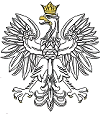 | KRZYZANOWSKI.COM |
- Links
- Source: Polish American Journal, "Wlodzimierz Krzyzanowski: Polonia's Forgotten Hero"
- Source: Arlington National Cemetery Website, Summary 1
- Source: Arlington National Cemetery Website, Summary 2
- Source: Polish Legion of American Veterans - USA
- Source: Prominent Poles by Roman Solecki, Professor Emeritus of Mechanical Engineering, University of Connecticut, Union, CT, USA
- Source: Polish American Cultural Center, Monuments Across America Honor General Wlodzmierz Krzyzanowski
- Anchorage Daily News | Barking up the wrong Pole: Hero wasn't governor.
- Images
1. Links
- For Liberty and Justice: A Biography of Brigadier General Wlodzimierz B. Krzyzanowski, 1824-1887 (Hardcover July 2009)
- For liberty and justice: The life and times of Wladimir Krzyzanowski (1st edition 1978)
- http://en.wikipedia.org/wiki/Wlodzimierz_Krzyzanowski
- http://www.arlingtoncemetery.net/wbkrzyzanowski.htm
- http://www.russscott.com/~rscott/26thwis/kryz.htm
- http://www.russscott.com/~rscott/26thwis/ltwkrz.htm
2. Source: Polish American Journal, "Wlodzimierz Krzyzanowski: Polonia's Forgotten Hero"
by James S. Pula - Graduate School and Continuing Education Dean at Utica College of Syracuse University (N.Y.), and historical writer.
Most Polish Americans are familiar with the services of Tadeusz Kosciuszko and Kazimierz Pulaski in the service of American independence, but few remember the contribution of another Pole of a later generation to the preservation of the union made possible by Kościuszko and Pulaski. The third military officer of note was Brigadier General Wlodzimierz Krzyzanowski. Born in Roznowo, Poland, in 1824, he grew up in a family deeply ingrained in the ideals of Polish patriotism. His first cousin was the Polish national composer Fryderyk Chopin, his father and both uncles fought for Polish independence under the banners of Napoleon, his brother fought in the November Uprising in 1830, and eventually he also took up the cause. Becoming involved in the conspiratorial movement led by Ludwik Mieroslawski, Krzyzanowski was forced to flee in the wake of that unsuccessful uprising. Tried in absentia by the Prussian authorities, he traveled to Hamburg where he boarded a ship for the New World to escape his Old World pursuers.
Arriving in New York unable to speak English, he found a room with a Polish livery driver, studied the new language, and gradually began to adapt to his new surroundings. After finding employment on the expanding railroads in the Midwest, he finally moved to Washington, D.C., where he married Caroline Burnett and settled into running a family pottery business. When the Civil War erupted at Ft. Sumter in April, 1861, Krzyzanowski joined the District of Columbia militia as a private soldier. When his ninety-day enlistment expired, he used his connections in the Washington immigrant community to raise a company of militia, of which he was named captain. From this beginning, he applied to the War Department and received permission to raise a regiment of infantry.
Recognizing that the population of Washington was not sufficient for his purposes, Krzyzanowski set up his headquarters in New York City, appealing to the large immigrant communities there, in Philadelphia, and throughout the eastern seaboard. Eventually, the men he raised were mustered into service as the 58th New York Volunteer Infantry, later known as the "Polish Legion." Comprised of a mixture of German, Polish, and other immigrant men, the regiment began mustering in on October 27, 1861.
Assigned to a division of immigrant troops commanded by Gen. Ludwig Blenker, Krzyzanowski first saw combat at the Battle of Cross Keys in the Virginia's Shenandoah Valley. There, on June 8, 1862, the Union troops met a portion of Confederate General "Stonewall" Jackson's force. In the ensuing engagement, rebel troops attacked the left flank of the Union position, drove it back, and threatened to encircle Blenker's division. In the time of crisis, Krzyzanowski led his regiment forward in a counterattack that blunted the Confederate assault and saved the Union flank from collapse.
Because of his performance at Cross Keys, when the army was reorganized later that summer Krzyzanowski found himself appointed to command of an entire brigade of four regiments assigned to the army commanded by Gen. John Pope. He led his brigade with great gallantry at the Second Battle of Bull Run, winning praise from his division commander, Gen. Karl Schurz.
On May 2, 1863, the Northern army under Gen. Joseph Hooker and Southern army under Gen. Robert E. Lee met at Chancellorsville, Virginia. After a successful march that placed the Union forces behind the Confederates, Southern General "Stonewall" Jackson secretly brought his rebel troops around the flank of the Northern army where he launched a surprise attack.
Caught unprepared, the Northern army was on the verge of a complete defeat as victorious rebels drove in the flank and threatened to capture the Union artillery and its supply wagons. One regiment after another collapsed under the onslaught. In the midst of the maelstrom of flying metal, Krzyzanowski aligned two small regiments of immigrants, his own 58th New York and the 26th Wisconsin, to meet the Confederate attack. Outnumbered by more than seven to one, the two regiments under Krzyzanowski's personal command held fast against repeated attacks from three sides, gaining twenty minutes of valuable time during which the artillery and supply wagons were saved.
Although the battle ended in defeat for the North, Krzyzanowski won praise from his superiors for his steadfast leadership and courage.
From Chancellorsville, the armies moved north with the Union troops chasing the invading Confederates through Maryland and on north into Pennsylvania. On July 1, 1863, the two antagonists met on the fields and hills surrounding Gettysburg in the largest battle ever fought on the North American continent. Arrayed north of town, Krzyzanowski's brigade was thrown into the middle of a raging battle when the right flank of the Union army collapsed and Confederate troops stormed toward town in an attempt to cut off the entire Northern force from its escape route. Once again outnumbered, with no defensive cover, his ranks torn by a crossfire of Confederate artillery from the flanks and savaged by rebel rifle fire from front and right, Krzyzanowski's brigade fought desperately for its survival. All five regimental commanders were killed or wounded, casualties surpassed 50%, and Krzyzanowski himself suffered a serious injury when his horse fell on him during the conflagration. Forced to retire, the men fought grudgingly, keeping the escape route open until the rest of the army escaped and then serving as rear guard as the retreating federal forces regrouped on Cemetery Hill.
Only July 2, Krzyzanowski's decimated force found itself in reserve near the Evergreen Cemetery near the spot where some four months later President Lincoln would deliver his famous Gettysburg Address. In the fading twilight of that evening, Confederate forces launched a surprise attack that broke through the Union lines, scaled the hill and took possession of the Northern artillery positions posted there. In those crucial few minutes, the fate of the Union truly lay in the balance. As soon as the firing began, Krzyzanowski ordered his men into line, personally leading them in an counterattack aimed at the heart of the Confederate advance. Rushing into the gun emplacements, Krzyzanowski's men fought hand-to-hand with the enemy, gradually reclaiming the artillery and forcing the Confederates back down the hill. Southern historian Douglas Southall Freeman cited it as the closest the South came to victory at Gettysburg, but it was frustrated by the Polish colonel and his immigrant soldiers, preserving the Union victory and reversing the course of the war.
From Gettysburg, Krzyzanowski was transferred to the west where he participated in the rescuing Union forces in Chattanooga from besieging Confederates, then helped to end a similar siege at Knoxville. In the spring of 1864 he was placed in charge of a vital federal supply base and spent the rest of the war guarding railroads and Union supply lines.
Following the war, Krzyzanowski served as a military administrator in the Reconstruction government in Georgia, then accepted various positions in the federal service as a treasury agent in Louisiana, the Washington Territory, Panama, and New York City. While assigned to the Washington Territory, he became the first U.S. government official to send in a detailed report on the newly purchased area of Alaska. Krzyzanowski's report detailed the mining and commercial activities of the area, made recommendations for administering the area, and formed the basis for the first American policies developed for the newly acquired area.
In a brief retirement in San Francisco during the 1870s, Krzyzanowski operated a tavern where he hosted meetings of Union army veterans and the local Polish immigrant community. While there, he was instrumental in arranging the American debut of the noted Polish Shakespearean actress Helena Modjeska (Helena Modrzejewska), while his tavern served as a place of relaxation where a young novelist studied the various personalities that frequented the establishment to converse and play cards with "the general."
In time, these personality sketches would be immortalized as Zagloba and other characters in the writings of Nobel Prize-winning author Henryk Sienkiewicz.
A man who fought, as he himself said, "for liberty and justice" in Poland and America, Krzyzanowski answered the call of both his native and his adopted lands. During the Civil War he risked his life in defense of American unity, during his career in the federal treasury service he struggled to eliminate smuggling and tax evasion, and in his private life he supported Polish patriotic causes and his fellow immigrants. A strong supporter of Polish American unity, he participated in early efforts to establish a national Polonia umbrella organization and spoke to meetings of his fellow Poles whenever possible. He was, and deserves to be remembered as a military hero and visionary Polonia activist who helped shape the early history of the nation and Polonia.
(source http://www.polamjournal.com/Library/Biographies/Krzyzanowski/krzyzanowski.html)
3. Source: Arlington National Cemetery Website, Summary 1
Krzyzanowski, Wladimir B.: Brigadier General, United States Army. Born: July 8, 1824, in the Prussian Polish city of Raznova. Like myriads of others who took part in revolutions which swept Europe in the 1840's, he was forced to emigrate and came to the United States in 1846, becoming a civil engineer in New York.
In 1861 he was instrumental in recruiting a regiment of Germans and Poles which was mustered into service as the 58th New York Volunteers. After duty at Washington, D.C. the regiment fought under Major General John C. Fremont at battle of Cross Keys against Stonewall Jackson and in the campaign of Second Manassas in Schurz's Division of Siegel's I (later XI) Corps, where "Kriz," as he was known in the army, commanded a brigade. The command was not engaged at Sharpsburg or Fredericksburg, but in May 1863 at Chancellorsville, it shared in disaster which befell Joseph Hooker's right when it was overwhelmed by Jackson's famous flanking maneuver.
On November 29, 1862, he had been appointed a Brigadier General but the Senate failed to act on the appointment and it expired by law on March 4, 1863. Note: Schurtz declared that the reason for his non-confirmation by the Senate was the inability of any Senator to pronounce his name.
The XI Corps was again badly mauled at Gettysburg, and in fall of 1863 was sent west with XII Corps under command of Joseph Hooker. The brigade took part in battle of Chattanooga and subsequently became part of 4th Div of XX Corps. It's commander, however, was detached during the Atlanta Campaign to command the post of Bridgeport, Alabama, vital railroad crossing of the Tennessee River. They continued in the defense of the Nashville and Chattanooga Railroad and was in command of post at Stevenson, Alabama, at the end of hostilities. He was brevetted Brigadier General of United States Volunteers, March 2, 1865, and honorably mustered out of the service on October 1.
He was then given a succession of minor appointments in California, Alaska, and South America by the Federal government. He was appointed a Special Agent of the Treasury Department at the New York Customs House in 1883, an office which he held until his death, January 31, 1887.
Arlington National Cemetery Section 1, Grave 832.
Krzyzanowski, Caroline Burnett: Wife of Wladimir B. Krzyzanowski. Died: New York City, January 11, 1882. Arlington National Cemetery, Section 1, Grave 832.
(source http://www.arlingtoncemetery.net/wbkrzyzanowski.htm)
4. Source: Arlington National Cemetery Website, Summary 2
Wlodzmierz B. Krzyzanowski, the best known Polish personality of the American Civil War, was born in Poland on July 8, 1824. He was a first cousin to Frederick Chopin. He took part in the 1848 Polish Revolt against Prussia and fled Poland to avoid arrest. He went to Hamburg, Germany and sailed from there to the United States.
He worked as an engineer and surveyor in Virginia and was instrumental in pushing America's railroads westward.
In Washington, D.C., he enlisted as a private two days after President Abraham Lincoln called for volunteers. He recruited a company of Polish immigrants which became one of the first companies of Union Soldiers. Krzyzanowski then moved his company to New York and enlisted more immigrants and soon became a Colonel of the 58th Infantry Division, listed in the official Army Register as the "Polish Legion." He participated in the Civil War battles of Cross-Keys, Bull Run, Chancellorsville, and Gettysburg. President Lincoln promoted him to General.
After the war, he served as an administrator in the newly acquired territory of Alaska. He died on January 31, 1887. On October 13, 1937, the 50th anniversary of his death, his remains were transferred with military honors from Greenwood Cemetery in Brooklyn, New York to Arlington National Cemetery near Washington, D.C. President Franklin D. Roosevelt broadcast his tribute to the nation via radio, and Poland's President, Ignacy Moscicki, transmitted his esteem from Warsaw.
(source http://www.arlingtoncemetery.net/wbkrzyzanowski.htm)
5. Source: Polish Legion of American Veterans - USA
Wladimir Krzyzanowski was born in Roznow, in what was known as Russian Poland. His father was a landowner and a veteran of the Napoleonic Wars. He came to America shortly after the Polish Insurrection of 1846.
When President Lincoln issued a proclamation calling for volunteers, Krzyzanowski organized one of the first companies of militia in Washington, D.C. He attempted to expand recruitment to form a Polish Legion for service in the Union Army; but only managed to recruit enough troops for four companies. In the fall of 1861, the War Department combined his original four companies with six others from New York State to form the 58th New York Volunteer Infantry Regiment, often referred to as the Polish Legion.
During the Battle of Cross Keys, the regiment won renown for itself by saving an endangered Federal Artillery position from certain capture. At one point, Krzyzanowski led the advance against Confederate forces with only a bayonet in his hand for a weapon.
A gallant officer, who distinguished himself at Bull Run. Chancellorsville and Gettysburg, Krzyzanowski was twice passed over for promotion because no one in the Senate could pronounce his name.
Krzyzanowski is interred in Arlington Cemetery.
(source http://www.plav.org/krzy.htm)
6. Source: Prominent Poles by Roman Solecki, Professor Emeritus of Mechanical Engineering, University of Connecticut, Union, CT, USA
Wlodzimierz (Wladimir) Bonawentura Krzyzanowski , US General, Polish-American Civil War hero.
Born: July 8, 1824, Roznow, Wielkopolska, Prussian partition of Poland known as the Grand Duchy of Poznan (presently Poland)
Died: January 31, 1887, New York City, New York, USA
Early days. Father - Stanislaw Krzyzanowski, a wealthy landowner of noble ancestry and a veteran of the Napoleonic Wars. Mother - Ludwika Pagowska.His paternal aunt, Justyna Krzyzanowska, was the mother of the Polish composer and pianist Fryderyk Chopin. Financial problems forced his family to sell the estate in 1827. After the death of his father, his mother and siblings moved to the Russian partition of Poland, while Wlodzimierz was adopted by his father's family in Poznan (Prussian partition) where he attended the high school.
Insurrection. Escape to the USA. In 1848 young Krzyzanowski took an active part in the Polish insurrection (under Ludwik Mieroslawski) against Prussia, which forced him to escape his native Poland in order to avoid arrest. Making his way to the German port at Hamburg, he eventually sailed for the United States. Following his arrival in New York City, Krzyzanowski learned to speak English and worked as a blue collar worker simultaneously continuing his education. Later he found employment as an engineer and surveyor in the forests of Virginia. Still later he participated in tracing new railroad tracks.
Marriage. Turner's Rifles. In 1854 he married Caroline Burnett, the daughter of General Burnett. When the Civil War began in 1861, Krzyzanowski lived in Washington, DC, where he formed a small company. He was also a functionary in the Republican Party, which at that time had in its program abolition of slavery. He raised a militia company, Company B, Turner's Rifles, District of Columbia Militia, of which he was Captain. When this unit's term of service ended, Krzyzanowski went to New York to raise a larger unit.
Polish Legion. This unit, originally known as Morgan's Rifles, comprised primarily of Germans and Poles became the 58th New York Company, also known as the "Polish Legion" ," with Krzyzanowski commissioned as captain of the regiment.
Cross Keys, Bull Run. Krzyzanowski's regiment's first engagement was at the Battle of Cross Keys, Virginia, on June 8, 1862, where they fought against the army of General Thomas J. "Stonewall" Jackson. A month later, at the Battle of Second Manassas (or Bull Run), "Kriz," as he was known in the army, commanded a brigade in General Franz Sigel's I (later XI) Corps. His brigade did not fight in the subsequent campaigns at Sharpsburg and Fredericksburg, but in May of 1863, at Chancellorsville, they were overwhelmed by General Jackson's famous flank march. Then, on November, 29, 1862, Krzyzanowski was appointed to the rank of brigadier general, but the Senate failed to act on the appointment and it eventually expired by law on March 4, 1863. (According to General Carl Schurz, the failure to put forth Krzyzanowski's nomination was due to the inability of individual senators to pronounce his name).
Gettysburg, Chattanooga. At Gettysburg, on July 2, 1863, his brigade again fought in conjunction with the XI Corps. During the battle, Krzyzanowski's horse was killed by an enemy shell and he tumbled to the ground severely injuring his chest. Nonetheless, he remained behind on the field, leading his brigade throughout that day's intense fight. After Gettysburg, the XI Corps and Krzyzanowski's brigade fought in the Battle of Chattanooga, Tennessee, in November of 1863. He served out the war as the commander of the defenses of the Nashville and Chattanooga Railroad. On March 2, 1865, Krzyzanowski received a brevet as brigadier and was mustered out on October 1. In the postwar years, Krzyzanowski was given a succession of minor appointments in California, Alaska and South America by the Federal government. He lived in San Francisco till 1878 and met there among others Henryk Sienkiewicz and Helena Modrzejewska.
Treasury Department. In 1883 he was appointed special agent of the Treasury Department in the New York custom house, an office which he held until his death caused by asthma and a lung disease on January 31, 1887. Four days later, on February 3, a Requiem Mass was said for him at St. Stanislaus Polish Catholic Church in New York City. After the religious service, his body was brought to Greenwood Cemetery, Brooklyn, for burial.
Reinterred at Arlington. Some fifty years later, in 1937, Polish leaders from across the United States arranged to have the late general's remains exhumed from Greenwood and reinterred at Arlington National Cemetery with full military honors. Following a memorial service at the Church of Our Lady of Czestochowa in New York City, the general's remains were accompanied by train to Arlington by some 500 members of Polish-American societies as well as his son, John Krzyzanowski, and several of his grandchildren. At the cemetery, in the presence of Polish president Ignacy Moscicki, President Franklin D. Roosevelt broadcast a final tribute to the great Polish-American Civil War hero via national radio. "General Krzyzanowski, whose patriotism we commemorate today, is another link to bind us to the people from which he came in the full tide of youthful promise when shadows lay over the land which gave him birth. It is high privilege to bear witness to the debt which this country owes to men of Polish blood. . . . These are the thought and reflections that come to mind today as we consign to Arlington National Cemetery the honored dust of a son of Poland who faithfully served the country of his adoption. General Krzyzanowski was the embodiment of the Polish ideal of liberty. . . ." said President Roosevelt.
This a modified version of the biography copied from Zorich with the permission of the author John Zorich.
Other sources used:
Langowski
Polish American Cultural Center
Joseph Dynia
For Liberty and Justice : The Life and Times of Wladimir Krzyzanowski
Published in Unknown Binding by Polish American Congress Charitable Foundation
Author: James S. Pula
(source http://www.angelfire.com/scifi2/rsolecki/wlodzimierz_krzyzanowski.html)
7. Source: Polish American Cultural Center, Monuments Across America Honor General Wlodzmierz Krzyzanowski
Krzyzanowski, Wlodzmierz B.
Military Leader: 1824 - 1887
Wlodzmierz B. Krzyzanowski, the best known Polish personality of the American Civil War, was born in Poland on July 8, 1824. He was a first cousin to Frederick Chopin. He took part in the 1848 Polish Revolt against Prussia and fled Poland to avoid arrest. He went to Hamburg, Germany and sailed from there to the United States. He worked as an engineer and surveyor in Virginia and was instrumental in pushing America's railroads westward. In Washington, D.C., he enlisted as a private two days after President Abraham Lincoln called for volunteers. He recruited a company of Polish immigrants which became one of the first companies of Union Soldiers. Krzyzanowski then moved his company to New York and enlisted more immigrants and soon became a Colonel of the 58th Infantry Division, listed in the official Army Register as the "Polish Legion." He participated in the Civil War battles of Cross-Keys, Bull Run, Chancellorsville, and Gettysburg. President Lincoln promoted him to General.
After the war, he served as an administrator in the newly acquired territory of Alaska. He died on January 31, 1887. On October 13, 1937, the 50th anniversary of his death, his remains were transferred with military honors from Greenwood Cemetery in Brooklyn, New York to Arlington National Cemetery near Washington, D.C. President Franklin D. Roosevelt broadcast his tribute to the nation via radio, and Poland's President, Ignacy Moscicki, transmitted his esteem from Warsaw.
(source http://www.polishamericancenter.org/Krzyzanowski.html)
8. Anchorage Daily News | Barking up the wrong Pole: Hero wasn't governor.
Barking up the wrong Pole: Hero wasn't governor
Web sites' misinformation perpetuates Krzyzanowski myth
By Liz Ruskin
Anchorage Daily News
(Published: December 20, 2002)
Alaska's first governor, the ambassador said at a reception in the
Capitol, was an American Civil War hero named Wladimir Krzyzanowski.
This was news to the experts in Alaska. No one named Krzyzanowski
appeared on their lists of Alaska's early military rulers or its
territorial governors.
But a quick Internet search proved that accounts of the Polish-born
general capping his illustrious military career by becoming the first
governor of Alaska were widespread in Polish-American circles. A Web site
for the man's hometown in Poland made the same claim.
Curious, state historian Joan Antonson sent an e-mail query to other
Alaska historians and researchers.
The government documents at the University of Alaska Fairbanks came up
dry, as did the Alaska bibliographer at the Loussac Library.
Then Susan Grigg, head of the Alaska and Polar Regions Department at
the UAF library, contacted James Pula, who wrote a 1978 biography of
Krzyzanowski.
"Essentially, he doesn't show up in their records because he was never
governor of Alaska," Pula explained. As far as Pula can tell, Kriz -- as
his friends called him -- never lived in Alaska, but visited in 1873 when
he was stationed in Port Townsend, Wash., as a Treasury Department agent.
Kriz, he said, uncovered corruption by the customs collector in Sitka,
investigated reports of gold discoveries and reported the potential for
revenue fraud in the area, among other achievements.
However, the governor myth was accepted by virtually all of the early
Polish-American historians, said Pula, dean of graduate education at Utica
College.
The error, he said, appears to stem from a bad translation or a
misinterpretation of Kriz's memoirs, which the general wrote for a Polish
newspaper that published them in serial form.
"In his memoirs he talks about being governor of Alaska, but the word
he uses is kind of a verb, to govern, to administrate," Pula said.
Here's one translation of what Kriz wrote about his Alaska experience:
"Administering the province of Alaska after it was acquired from Russia
gave me additional knowledge of the northernmost borders of the United
States.
"The costly furs and gold that were discovered during my administration
have helped the nation immensely."
Pula believes Kriz was not intentionally padding his resume, just
trying to say that he was a government employee charged with administering
government policies. Pula had two neutral translators read the relevant
passage in Polish and neither came to the conclusion he was the governor
of Alaska, he said.
But the myth has taken hold among Polish-Americans. The Web sites of at
least 10 organizations declare Kriz to be the first governor of Alaska.
A spokesman for the Polish embassy in Washington said the ambassador's
remarks about Krzyzanowski were drawn from two different Internet sources.
"We simply got it not correct," said the spokesman, Artur Michalski.
"We fell to the victim of this legend."
That's one of the lessons here, said Antonson, the state historian.
"It's a classic example of 'Be wary when using the Internet,' " she
said.
She and Bruce Merrell, at the Loussac Library, say they want to learn
more about Krzyzanowski's mission in Alaska.
According to Pula, it was significant. His work as a treasury agent
"led to a more effective administration of Alaska that enabled people
residing there to live in greater safety and prosperity," Pula wrote in
his book. "It is for this he should be remembered with pride by
Polish-Americans.'
Joe Krzyzanowski, a Maryland man who runs the Krzyzanowski.com Web site, said he
doesn't think taking the title of Alaska chief executive away from the
general dulls the luster of the family name.
"He's done so many other things," Joe Krzyzanowski said. "If he wasn't
governor of Alaska, it's no big deal."
Reporter Liz Ruskin can be reached at 1-202-383-0007 or lruskin@adn.com.
9. Images
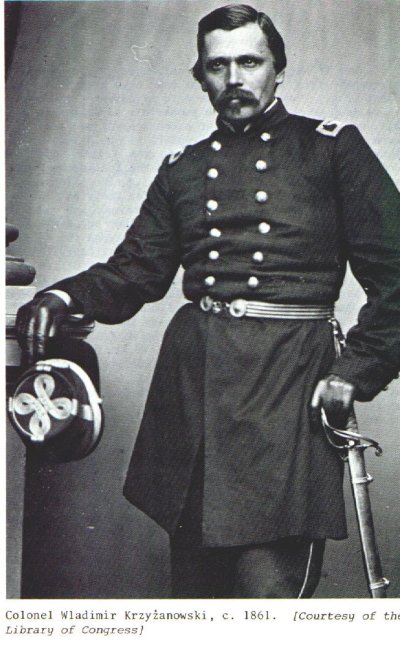
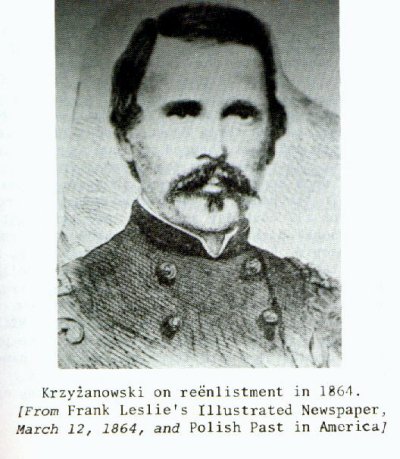
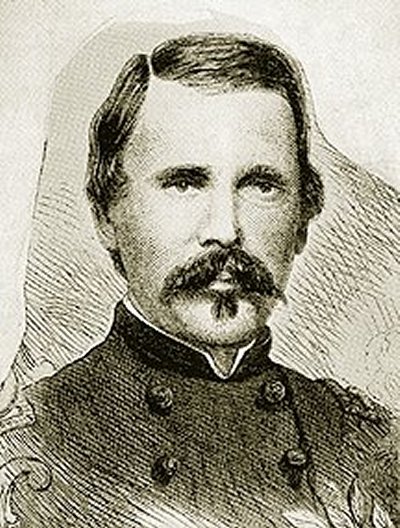
(source http://www.polamjournal.com/Library/Biographies/Krzyzanowski/krzyzanowski.html)
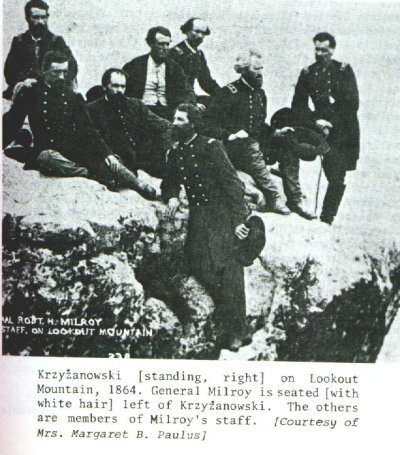
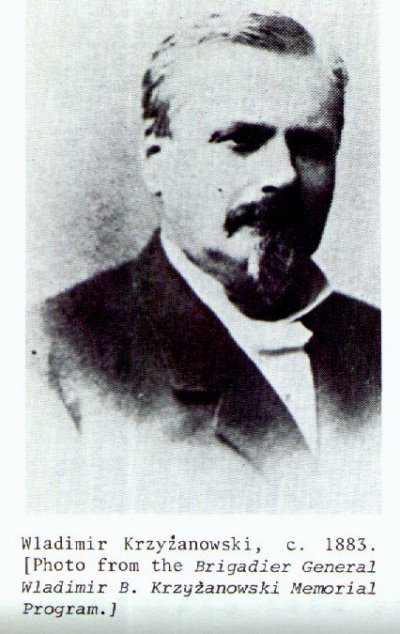
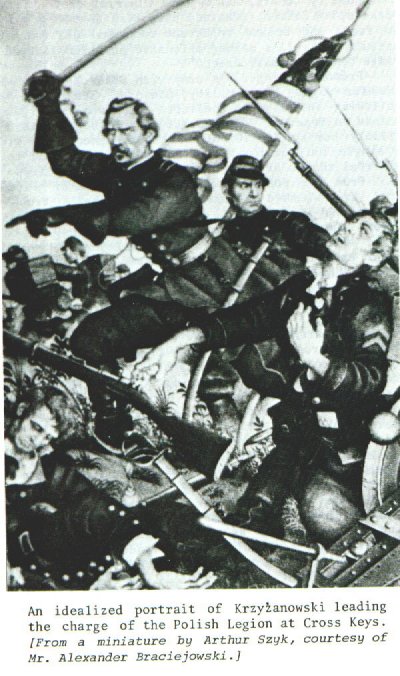
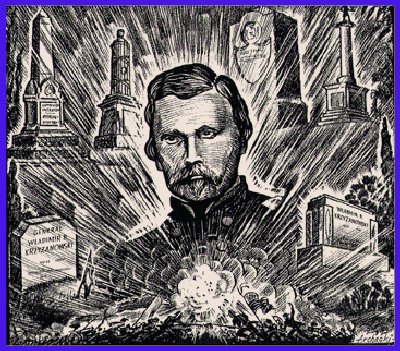
(source http://www.polishamericancenter.org/Krzyzanowski.html)
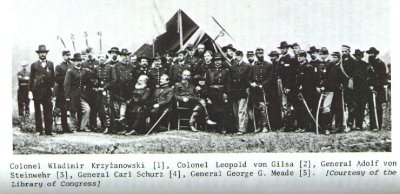
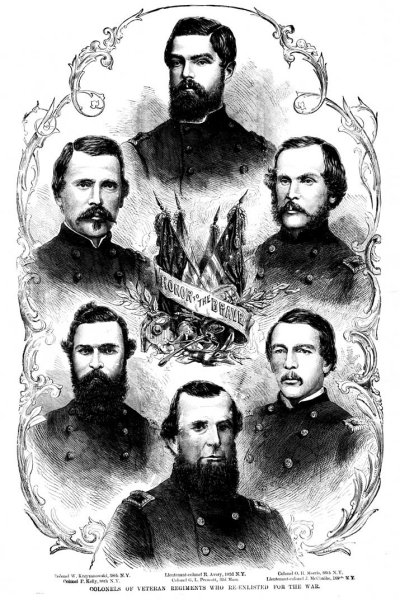
(source http://frankleslie.com/soldierv2/252.jpg)
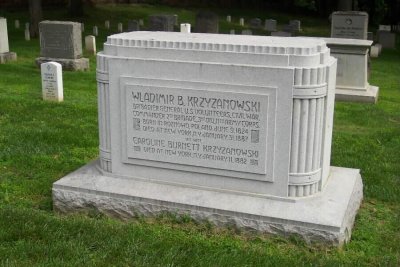
(source http://www.arlingtoncemetery.net/wbkrzyzanowski.htm)

Join Us on Facebook!

(Hardcover July 2009)
visitors since December 22, 1998